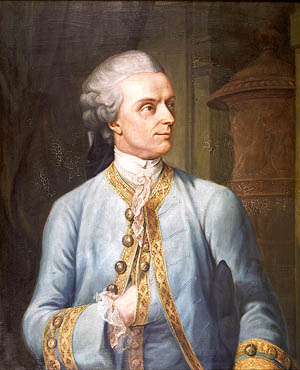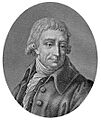Christian Gottlob Heyne facts for kids
Quick facts for kids
Christian Gottlob Heyne
|
|
|---|---|

by Johann Heinrich Wilhelm Tischbein
|
|
| Born | 25 September 1729 Chemnitz, Saxony
|
| Died | 14 July 1812 (aged 82) Göttingen, Westphalia
|
| Alma mater | Leipzig University |
| Occupation | German classical scholar, archaeologist, director of the Göttingen State and University Library |
Christian Gottlob Heyne (born September 25, 1729 – died July 14, 1812) was an important German scholar. He studied classical antiquity, which means he focused on the ancient Greek and Roman worlds. He was also an archaeologist, someone who studies human history by digging up old sites and objects. For a long time, he was the director of the Göttingen State and University Library, a very important library.
Contents
Life Story of Christian Gottlob Heyne
Early Life and Education
Christian Gottlob Heyne was born in Chemnitz, a city in Saxony, Germany. His father was a poor weaver who had moved there to keep his Protestant faith. Christian's education was paid for by his godfather.
In 1748, he started studying at the Leipzig University. He often struggled with money and didn't have enough for basic needs. A kind classicist named Johann Friedrich Christ helped him by lending him Greek and Latin books.
Heyne found a job as a tutor for a French merchant's family in Leipzig. This helped him continue his studies. In 1752, he earned a master's degree. However, he still faced many years of poverty.
Struggles and Early Work
Heyne wrote a poem in Latin when a friend died. This poem caught the eye of Count von Brühl, a powerful prime minister. In April 1752, Heyne traveled to Dresden, hoping his luck had changed.
He was welcomed and promised a good job as a secretary with a high salary, but nothing happened. He went through another tough period without money. After much effort, Heyne finally got a small job as an under-clerk in the count's library. His salary was very low.
To earn more money, Heyne did translations. He translated some French novels and a Greek romance story into German. He also published his first edition of the Roman poet Tibullus in 1755. In 1756, he published his work on Epictetus, a Greek philosopher.
Challenges During Wartime
The Seven Years' War began in 1756. The library where Heyne worked was destroyed, and he lost everything again. In 1757, he became a tutor for Frau von Schönberg's family. There, he met his future wife.
In 1758, Heyne went with his student to the University of Wittenberg. But the Prussian army invaded, forcing him to leave in 1760. The city of Dresden was bombed on July 18, 1760. This destroyed all his belongings, including a nearly finished book he was working on.
In the summer of 1761, Heyne was still without a steady income. He got married and became a land manager for Baron von Löben. By the end of 1762, he returned to Dresden. There, he was hired to prepare a Latin text for a book about a collection of gems.
A New Opportunity in Göttingen
In 1761, a teaching position opened at the University of Göttingen. Two other scholars turned down the job. They suggested that Heyne should get it instead. So, in 1763, Heyne was offered the position.
His salary slowly increased over time. He became very famous, and other German governments offered him better jobs, but he always refused them. Heyne was also made the director of the university library at the same time. He held this important job until he died in 1812.
Under Heyne's leadership, the Göttingen State and University Library grew a lot. It became one of the world's leading academic libraries. This was thanks to his new ways of organizing books and his efforts to buy books from all over the world.
Heyne's Contributions to Scholarship
Heyne believed that studying grammar and language was a way to understand ancient texts better, not the main goal itself. He was the first scholar to try to study Greek mythology in a scientific way. He greatly helped the study of philology, which is the study of language in historical and cultural contexts.
Heyne wrote many books and articles. Some of his important works include new editions of famous ancient writers like Virgil and Homer. He also wrote Opuscula academica, a collection of over a hundred academic essays. These essays included valuable information about ancient Greek colonies and Etruscan art and history. He also wrote many articles for a scholarly newspaper.
Heyne was elected a Fellow of the Royal Society in April 1789. He died in Göttingen in 1812.
Family Life
In 1761, Heyne married his first wife, Therese. She was the daughter of a famous musician. They had four children who lived to adulthood. Their son, Benjamin Heyne, became a botanist and surgeon who worked in India. Their daughter, Therese Huber, became one of Germany's first well-known female journalists.
After his first wife passed away in 1775, Heyne married Georgine Brandes in 1777. They had six children together.
See also
 In Spanish: Christian Gottlob Heyne para niños
In Spanish: Christian Gottlob Heyne para niños
- Johann Christian Gottlieb Ackermann
Images for kids
 | James Van Der Zee |
 | Alma Thomas |
 | Ellis Wilson |
 | Margaret Taylor-Burroughs |


